Detailed Analysis: Inclusive Practice in Higher Education Frameworks
VerifiedAdded on 2023/01/06
|11
|3736
|43
Report
AI Summary
This report provides a comprehensive overview of inclusive practice in an educational setting. It begins by examining the impact of personal, social, and cultural factors on learning, as well as the influence of cognitive, physical, and sensory abilities. The report then summarizes relevant policy and regulatory frameworks, explaining their influence on organizational policies and individual practice. It delves into the roles and responsibilities related to inclusive practice, highlighting the relationships between different professionals and available referral points. Key features and benefits of an inclusive learning environment are reviewed, along with strategies for promoting equality, valuing diversity, and fostering inclusion. The report concludes with a self-assessment of inclusive practice, identifying strengths, areas for improvement, and opportunities for skill enhancement. The report offers a detailed analysis of inclusive practices, making it a valuable resource for educators and practitioners in the field.
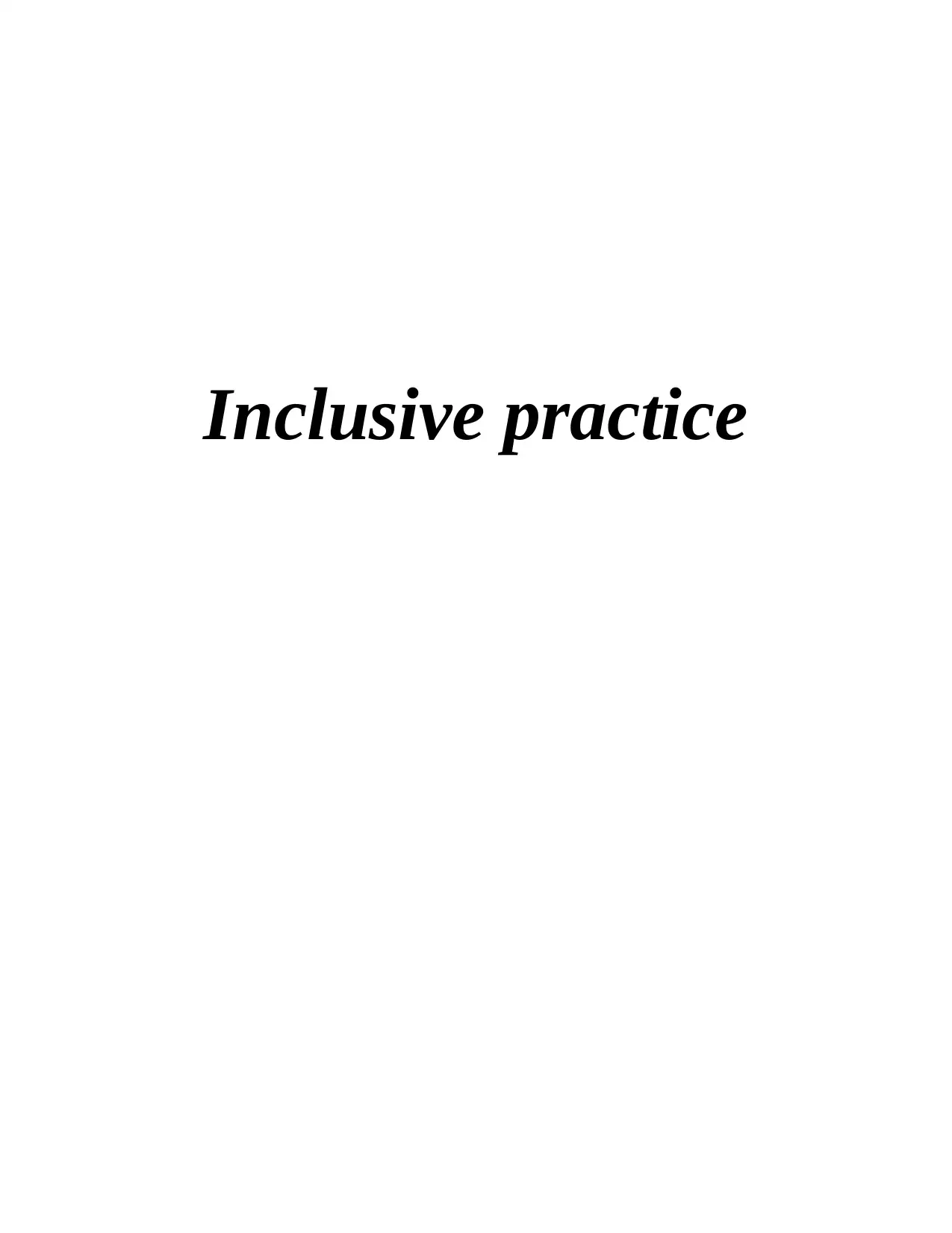
Inclusive practice
Paraphrase This Document
Need a fresh take? Get an instant paraphrase of this document with our AI Paraphraser
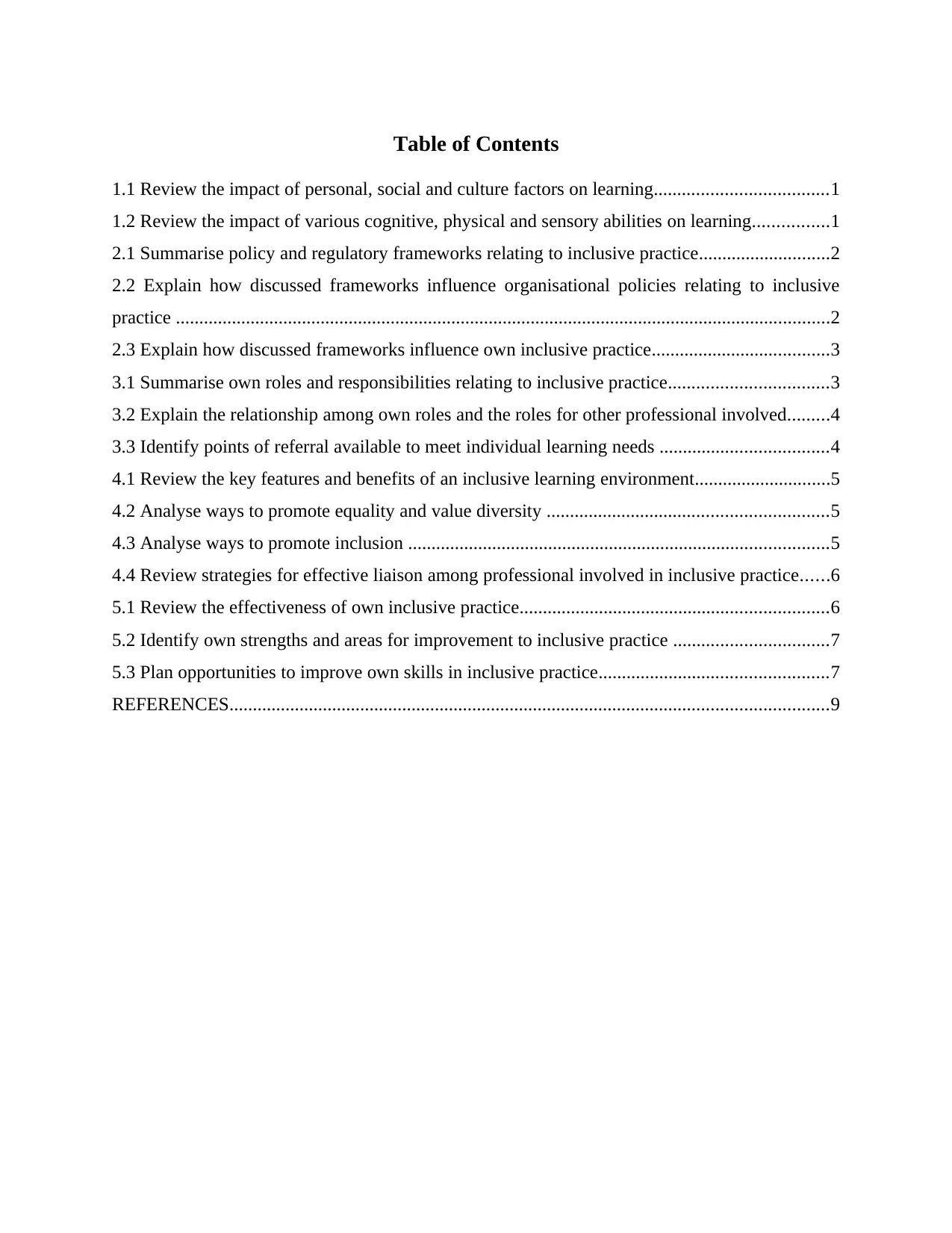
Table of Contents
1.1 Review the impact of personal, social and culture factors on learning.....................................1
1.2 Review the impact of various cognitive, physical and sensory abilities on learning................1
2.1 Summarise policy and regulatory frameworks relating to inclusive practice............................2
2.2 Explain how discussed frameworks influence organisational policies relating to inclusive
practice ............................................................................................................................................2
2.3 Explain how discussed frameworks influence own inclusive practice......................................3
3.1 Summarise own roles and responsibilities relating to inclusive practice..................................3
3.2 Explain the relationship among own roles and the roles for other professional involved.........4
3.3 Identify points of referral available to meet individual learning needs ....................................4
4.1 Review the key features and benefits of an inclusive learning environment.............................5
4.2 Analyse ways to promote equality and value diversity ............................................................5
4.3 Analyse ways to promote inclusion ..........................................................................................5
4.4 Review strategies for effective liaison among professional involved in inclusive practice......6
5.1 Review the effectiveness of own inclusive practice..................................................................6
5.2 Identify own strengths and areas for improvement to inclusive practice .................................7
5.3 Plan opportunities to improve own skills in inclusive practice.................................................7
REFERENCES................................................................................................................................9
1.1 Review the impact of personal, social and culture factors on learning.....................................1
1.2 Review the impact of various cognitive, physical and sensory abilities on learning................1
2.1 Summarise policy and regulatory frameworks relating to inclusive practice............................2
2.2 Explain how discussed frameworks influence organisational policies relating to inclusive
practice ............................................................................................................................................2
2.3 Explain how discussed frameworks influence own inclusive practice......................................3
3.1 Summarise own roles and responsibilities relating to inclusive practice..................................3
3.2 Explain the relationship among own roles and the roles for other professional involved.........4
3.3 Identify points of referral available to meet individual learning needs ....................................4
4.1 Review the key features and benefits of an inclusive learning environment.............................5
4.2 Analyse ways to promote equality and value diversity ............................................................5
4.3 Analyse ways to promote inclusion ..........................................................................................5
4.4 Review strategies for effective liaison among professional involved in inclusive practice......6
5.1 Review the effectiveness of own inclusive practice..................................................................6
5.2 Identify own strengths and areas for improvement to inclusive practice .................................7
5.3 Plan opportunities to improve own skills in inclusive practice.................................................7
REFERENCES................................................................................................................................9
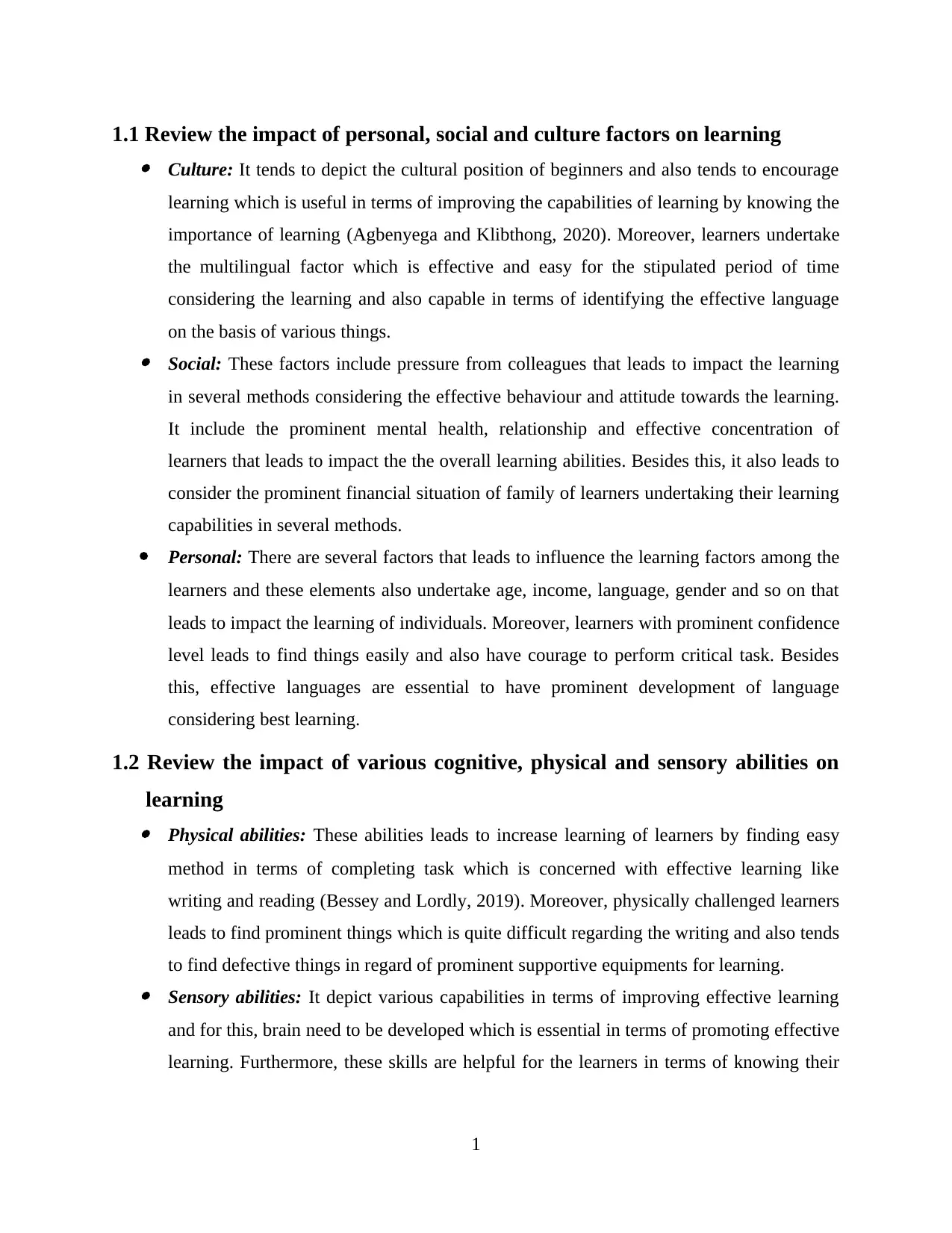
1.1 Review the impact of personal, social and culture factors on learning Culture: It tends to depict the cultural position of beginners and also tends to encourage
learning which is useful in terms of improving the capabilities of learning by knowing the
importance of learning (Agbenyega and Klibthong, 2020). Moreover, learners undertake
the multilingual factor which is effective and easy for the stipulated period of time
considering the learning and also capable in terms of identifying the effective language
on the basis of various things. Social: These factors include pressure from colleagues that leads to impact the learning
in several methods considering the effective behaviour and attitude towards the learning.
It include the prominent mental health, relationship and effective concentration of
learners that leads to impact the the overall learning abilities. Besides this, it also leads to
consider the prominent financial situation of family of learners undertaking their learning
capabilities in several methods.
Personal: There are several factors that leads to influence the learning factors among the
learners and these elements also undertake age, income, language, gender and so on that
leads to impact the learning of individuals. Moreover, learners with prominent confidence
level leads to find things easily and also have courage to perform critical task. Besides
this, effective languages are essential to have prominent development of language
considering best learning.
1.2 Review the impact of various cognitive, physical and sensory abilities on
learning Physical abilities: These abilities leads to increase learning of learners by finding easy
method in terms of completing task which is concerned with effective learning like
writing and reading (Bessey and Lordly, 2019). Moreover, physically challenged learners
leads to find prominent things which is quite difficult regarding the writing and also tends
to find defective things in regard of prominent supportive equipments for learning. Sensory abilities: It depict various capabilities in terms of improving effective learning
and for this, brain need to be developed which is essential in terms of promoting effective
learning. Furthermore, these skills are helpful for the learners in terms of knowing their
1
learning which is useful in terms of improving the capabilities of learning by knowing the
importance of learning (Agbenyega and Klibthong, 2020). Moreover, learners undertake
the multilingual factor which is effective and easy for the stipulated period of time
considering the learning and also capable in terms of identifying the effective language
on the basis of various things. Social: These factors include pressure from colleagues that leads to impact the learning
in several methods considering the effective behaviour and attitude towards the learning.
It include the prominent mental health, relationship and effective concentration of
learners that leads to impact the the overall learning abilities. Besides this, it also leads to
consider the prominent financial situation of family of learners undertaking their learning
capabilities in several methods.
Personal: There are several factors that leads to influence the learning factors among the
learners and these elements also undertake age, income, language, gender and so on that
leads to impact the learning of individuals. Moreover, learners with prominent confidence
level leads to find things easily and also have courage to perform critical task. Besides
this, effective languages are essential to have prominent development of language
considering best learning.
1.2 Review the impact of various cognitive, physical and sensory abilities on
learning Physical abilities: These abilities leads to increase learning of learners by finding easy
method in terms of completing task which is concerned with effective learning like
writing and reading (Bessey and Lordly, 2019). Moreover, physically challenged learners
leads to find prominent things which is quite difficult regarding the writing and also tends
to find defective things in regard of prominent supportive equipments for learning. Sensory abilities: It depict various capabilities in terms of improving effective learning
and for this, brain need to be developed which is essential in terms of promoting effective
learning. Furthermore, these skills are helpful for the learners in terms of knowing their
1
⊘ This is a preview!⊘
Do you want full access?
Subscribe today to unlock all pages.

Trusted by 1+ million students worldwide
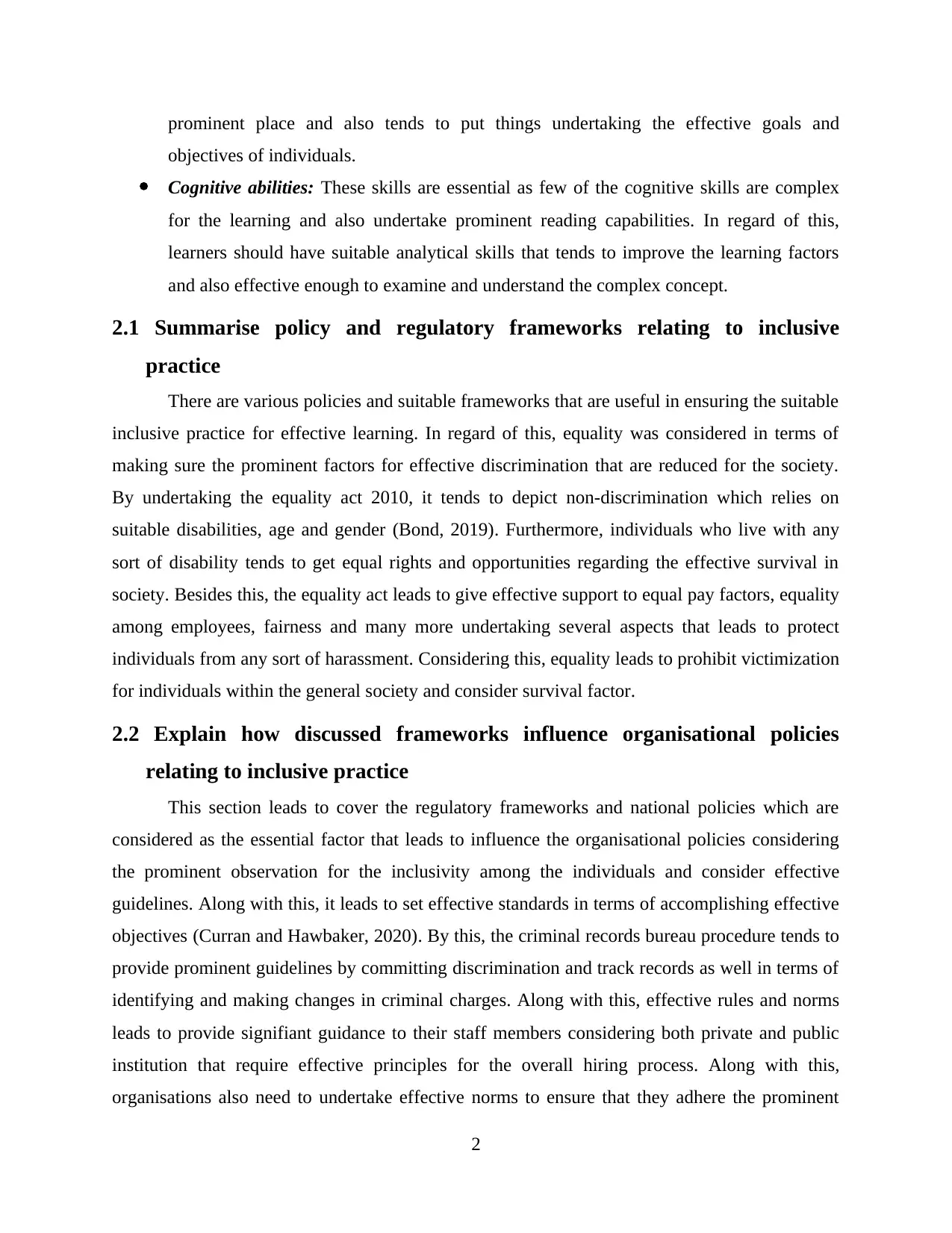
prominent place and also tends to put things undertaking the effective goals and
objectives of individuals.
Cognitive abilities: These skills are essential as few of the cognitive skills are complex
for the learning and also undertake prominent reading capabilities. In regard of this,
learners should have suitable analytical skills that tends to improve the learning factors
and also effective enough to examine and understand the complex concept.
2.1 Summarise policy and regulatory frameworks relating to inclusive
practice
There are various policies and suitable frameworks that are useful in ensuring the suitable
inclusive practice for effective learning. In regard of this, equality was considered in terms of
making sure the prominent factors for effective discrimination that are reduced for the society.
By undertaking the equality act 2010, it tends to depict non-discrimination which relies on
suitable disabilities, age and gender (Bond, 2019). Furthermore, individuals who live with any
sort of disability tends to get equal rights and opportunities regarding the effective survival in
society. Besides this, the equality act leads to give effective support to equal pay factors, equality
among employees, fairness and many more undertaking several aspects that leads to protect
individuals from any sort of harassment. Considering this, equality leads to prohibit victimization
for individuals within the general society and consider survival factor.
2.2 Explain how discussed frameworks influence organisational policies
relating to inclusive practice
This section leads to cover the regulatory frameworks and national policies which are
considered as the essential factor that leads to influence the organisational policies considering
the prominent observation for the inclusivity among the individuals and consider effective
guidelines. Along with this, it leads to set effective standards in terms of accomplishing effective
objectives (Curran and Hawbaker, 2020). By this, the criminal records bureau procedure tends to
provide prominent guidelines by committing discrimination and track records as well in terms of
identifying and making changes in criminal charges. Along with this, effective rules and norms
leads to provide signifiant guidance to their staff members considering both private and public
institution that require effective principles for the overall hiring process. Along with this,
organisations also need to undertake effective norms to ensure that they adhere the prominent
2
objectives of individuals.
Cognitive abilities: These skills are essential as few of the cognitive skills are complex
for the learning and also undertake prominent reading capabilities. In regard of this,
learners should have suitable analytical skills that tends to improve the learning factors
and also effective enough to examine and understand the complex concept.
2.1 Summarise policy and regulatory frameworks relating to inclusive
practice
There are various policies and suitable frameworks that are useful in ensuring the suitable
inclusive practice for effective learning. In regard of this, equality was considered in terms of
making sure the prominent factors for effective discrimination that are reduced for the society.
By undertaking the equality act 2010, it tends to depict non-discrimination which relies on
suitable disabilities, age and gender (Bond, 2019). Furthermore, individuals who live with any
sort of disability tends to get equal rights and opportunities regarding the effective survival in
society. Besides this, the equality act leads to give effective support to equal pay factors, equality
among employees, fairness and many more undertaking several aspects that leads to protect
individuals from any sort of harassment. Considering this, equality leads to prohibit victimization
for individuals within the general society and consider survival factor.
2.2 Explain how discussed frameworks influence organisational policies
relating to inclusive practice
This section leads to cover the regulatory frameworks and national policies which are
considered as the essential factor that leads to influence the organisational policies considering
the prominent observation for the inclusivity among the individuals and consider effective
guidelines. Along with this, it leads to set effective standards in terms of accomplishing effective
objectives (Curran and Hawbaker, 2020). By this, the criminal records bureau procedure tends to
provide prominent guidelines by committing discrimination and track records as well in terms of
identifying and making changes in criminal charges. Along with this, effective rules and norms
leads to provide signifiant guidance to their staff members considering both private and public
institution that require effective principles for the overall hiring process. Along with this,
organisations also need to undertake effective norms to ensure that they adhere the prominent
2
Paraphrase This Document
Need a fresh take? Get an instant paraphrase of this document with our AI Paraphraser
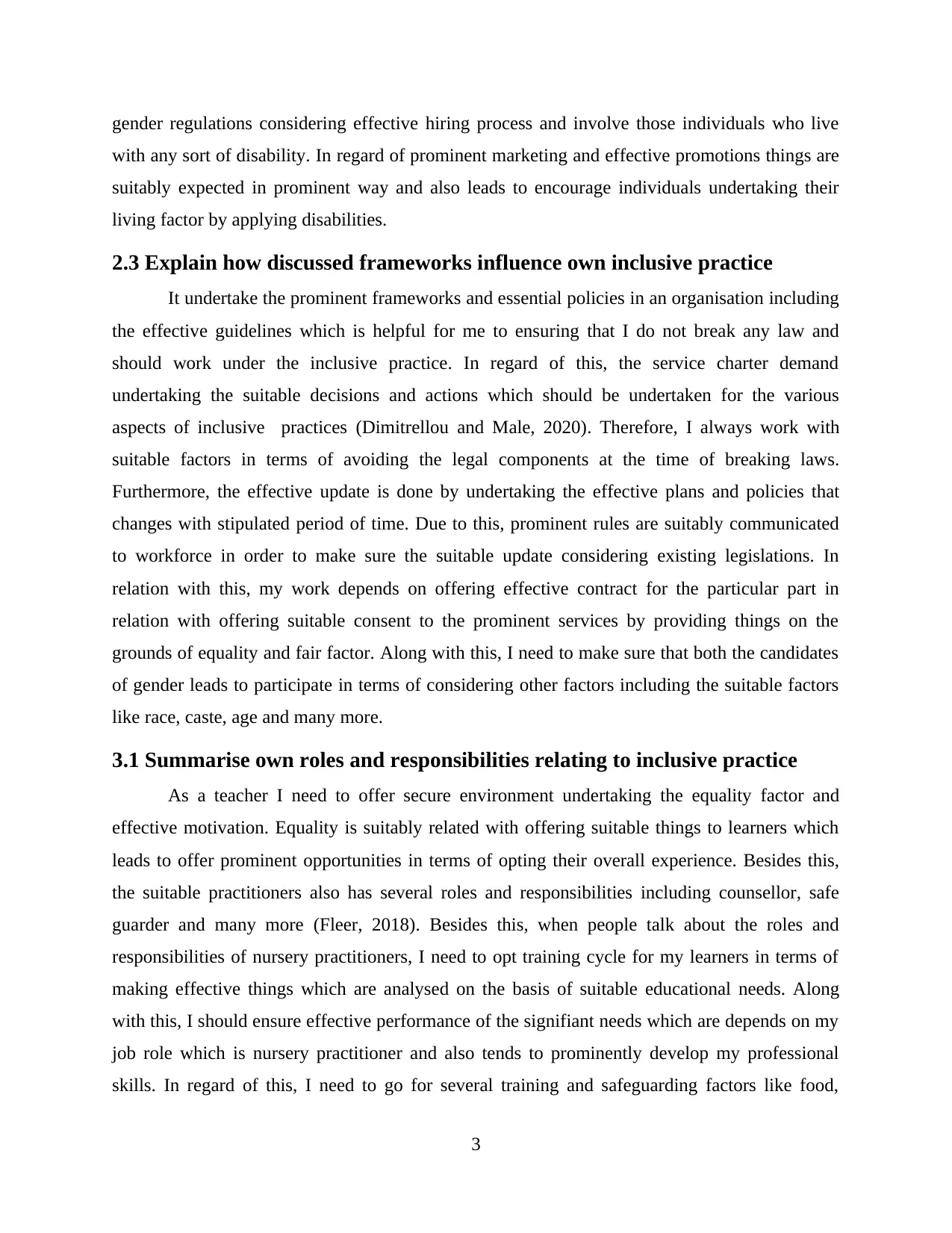
gender regulations considering effective hiring process and involve those individuals who live
with any sort of disability. In regard of prominent marketing and effective promotions things are
suitably expected in prominent way and also leads to encourage individuals undertaking their
living factor by applying disabilities.
2.3 Explain how discussed frameworks influence own inclusive practice
It undertake the prominent frameworks and essential policies in an organisation including
the effective guidelines which is helpful for me to ensuring that I do not break any law and
should work under the inclusive practice. In regard of this, the service charter demand
undertaking the suitable decisions and actions which should be undertaken for the various
aspects of inclusive practices (Dimitrellou and Male, 2020). Therefore, I always work with
suitable factors in terms of avoiding the legal components at the time of breaking laws.
Furthermore, the effective update is done by undertaking the effective plans and policies that
changes with stipulated period of time. Due to this, prominent rules are suitably communicated
to workforce in order to make sure the suitable update considering existing legislations. In
relation with this, my work depends on offering effective contract for the particular part in
relation with offering suitable consent to the prominent services by providing things on the
grounds of equality and fair factor. Along with this, I need to make sure that both the candidates
of gender leads to participate in terms of considering other factors including the suitable factors
like race, caste, age and many more.
3.1 Summarise own roles and responsibilities relating to inclusive practice
As a teacher I need to offer secure environment undertaking the equality factor and
effective motivation. Equality is suitably related with offering suitable things to learners which
leads to offer prominent opportunities in terms of opting their overall experience. Besides this,
the suitable practitioners also has several roles and responsibilities including counsellor, safe
guarder and many more (Fleer, 2018). Besides this, when people talk about the roles and
responsibilities of nursery practitioners, I need to opt training cycle for my learners in terms of
making effective things which are analysed on the basis of suitable educational needs. Along
with this, I should ensure effective performance of the signifiant needs which are depends on my
job role which is nursery practitioner and also tends to prominently develop my professional
skills. In regard of this, I need to go for several training and safeguarding factors like food,
3
with any sort of disability. In regard of prominent marketing and effective promotions things are
suitably expected in prominent way and also leads to encourage individuals undertaking their
living factor by applying disabilities.
2.3 Explain how discussed frameworks influence own inclusive practice
It undertake the prominent frameworks and essential policies in an organisation including
the effective guidelines which is helpful for me to ensuring that I do not break any law and
should work under the inclusive practice. In regard of this, the service charter demand
undertaking the suitable decisions and actions which should be undertaken for the various
aspects of inclusive practices (Dimitrellou and Male, 2020). Therefore, I always work with
suitable factors in terms of avoiding the legal components at the time of breaking laws.
Furthermore, the effective update is done by undertaking the effective plans and policies that
changes with stipulated period of time. Due to this, prominent rules are suitably communicated
to workforce in order to make sure the suitable update considering existing legislations. In
relation with this, my work depends on offering effective contract for the particular part in
relation with offering suitable consent to the prominent services by providing things on the
grounds of equality and fair factor. Along with this, I need to make sure that both the candidates
of gender leads to participate in terms of considering other factors including the suitable factors
like race, caste, age and many more.
3.1 Summarise own roles and responsibilities relating to inclusive practice
As a teacher I need to offer secure environment undertaking the equality factor and
effective motivation. Equality is suitably related with offering suitable things to learners which
leads to offer prominent opportunities in terms of opting their overall experience. Besides this,
the suitable practitioners also has several roles and responsibilities including counsellor, safe
guarder and many more (Fleer, 2018). Besides this, when people talk about the roles and
responsibilities of nursery practitioners, I need to opt training cycle for my learners in terms of
making effective things which are analysed on the basis of suitable educational needs. Along
with this, I should ensure effective performance of the signifiant needs which are depends on my
job role which is nursery practitioner and also tends to prominently develop my professional
skills. In regard of this, I need to go for several training and safeguarding factors like food,
3
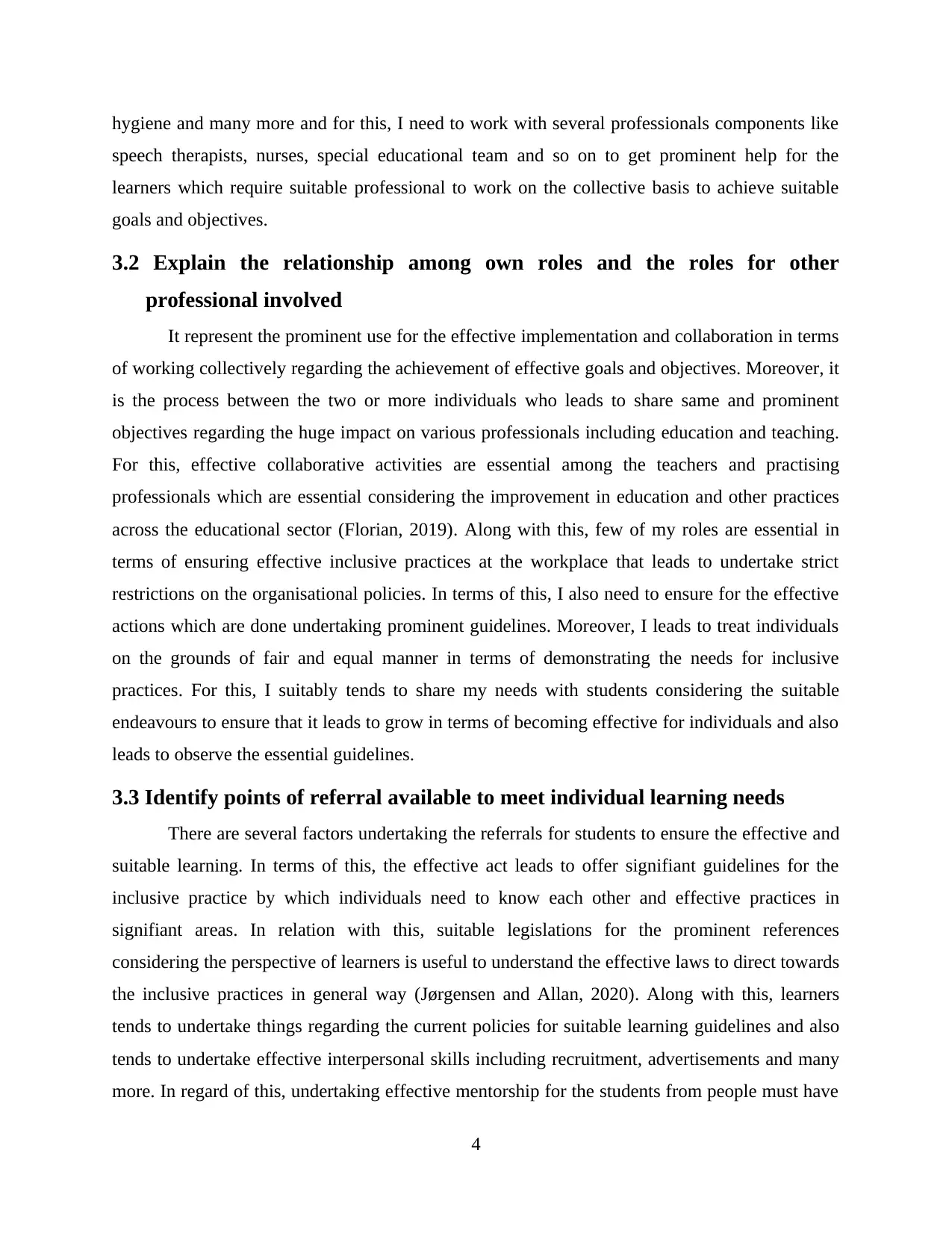
hygiene and many more and for this, I need to work with several professionals components like
speech therapists, nurses, special educational team and so on to get prominent help for the
learners which require suitable professional to work on the collective basis to achieve suitable
goals and objectives.
3.2 Explain the relationship among own roles and the roles for other
professional involved
It represent the prominent use for the effective implementation and collaboration in terms
of working collectively regarding the achievement of effective goals and objectives. Moreover, it
is the process between the two or more individuals who leads to share same and prominent
objectives regarding the huge impact on various professionals including education and teaching.
For this, effective collaborative activities are essential among the teachers and practising
professionals which are essential considering the improvement in education and other practices
across the educational sector (Florian, 2019). Along with this, few of my roles are essential in
terms of ensuring effective inclusive practices at the workplace that leads to undertake strict
restrictions on the organisational policies. In terms of this, I also need to ensure for the effective
actions which are done undertaking prominent guidelines. Moreover, I leads to treat individuals
on the grounds of fair and equal manner in terms of demonstrating the needs for inclusive
practices. For this, I suitably tends to share my needs with students considering the suitable
endeavours to ensure that it leads to grow in terms of becoming effective for individuals and also
leads to observe the essential guidelines.
3.3 Identify points of referral available to meet individual learning needs
There are several factors undertaking the referrals for students to ensure the effective and
suitable learning. In terms of this, the effective act leads to offer signifiant guidelines for the
inclusive practice by which individuals need to know each other and effective practices in
signifiant areas. In relation with this, suitable legislations for the prominent references
considering the perspective of learners is useful to understand the effective laws to direct towards
the inclusive practices in general way (Jørgensen and Allan, 2020). Along with this, learners
tends to undertake things regarding the current policies for suitable learning guidelines and also
tends to undertake effective interpersonal skills including recruitment, advertisements and many
more. In regard of this, undertaking effective mentorship for the students from people must have
4
speech therapists, nurses, special educational team and so on to get prominent help for the
learners which require suitable professional to work on the collective basis to achieve suitable
goals and objectives.
3.2 Explain the relationship among own roles and the roles for other
professional involved
It represent the prominent use for the effective implementation and collaboration in terms
of working collectively regarding the achievement of effective goals and objectives. Moreover, it
is the process between the two or more individuals who leads to share same and prominent
objectives regarding the huge impact on various professionals including education and teaching.
For this, effective collaborative activities are essential among the teachers and practising
professionals which are essential considering the improvement in education and other practices
across the educational sector (Florian, 2019). Along with this, few of my roles are essential in
terms of ensuring effective inclusive practices at the workplace that leads to undertake strict
restrictions on the organisational policies. In terms of this, I also need to ensure for the effective
actions which are done undertaking prominent guidelines. Moreover, I leads to treat individuals
on the grounds of fair and equal manner in terms of demonstrating the needs for inclusive
practices. For this, I suitably tends to share my needs with students considering the suitable
endeavours to ensure that it leads to grow in terms of becoming effective for individuals and also
leads to observe the essential guidelines.
3.3 Identify points of referral available to meet individual learning needs
There are several factors undertaking the referrals for students to ensure the effective and
suitable learning. In terms of this, the effective act leads to offer signifiant guidelines for the
inclusive practice by which individuals need to know each other and effective practices in
signifiant areas. In relation with this, suitable legislations for the prominent references
considering the perspective of learners is useful to understand the effective laws to direct towards
the inclusive practices in general way (Jørgensen and Allan, 2020). Along with this, learners
tends to undertake things regarding the current policies for suitable learning guidelines and also
tends to undertake effective interpersonal skills including recruitment, advertisements and many
more. In regard of this, undertaking effective mentorship for the students from people must have
4
⊘ This is a preview!⊘
Do you want full access?
Subscribe today to unlock all pages.

Trusted by 1+ million students worldwide
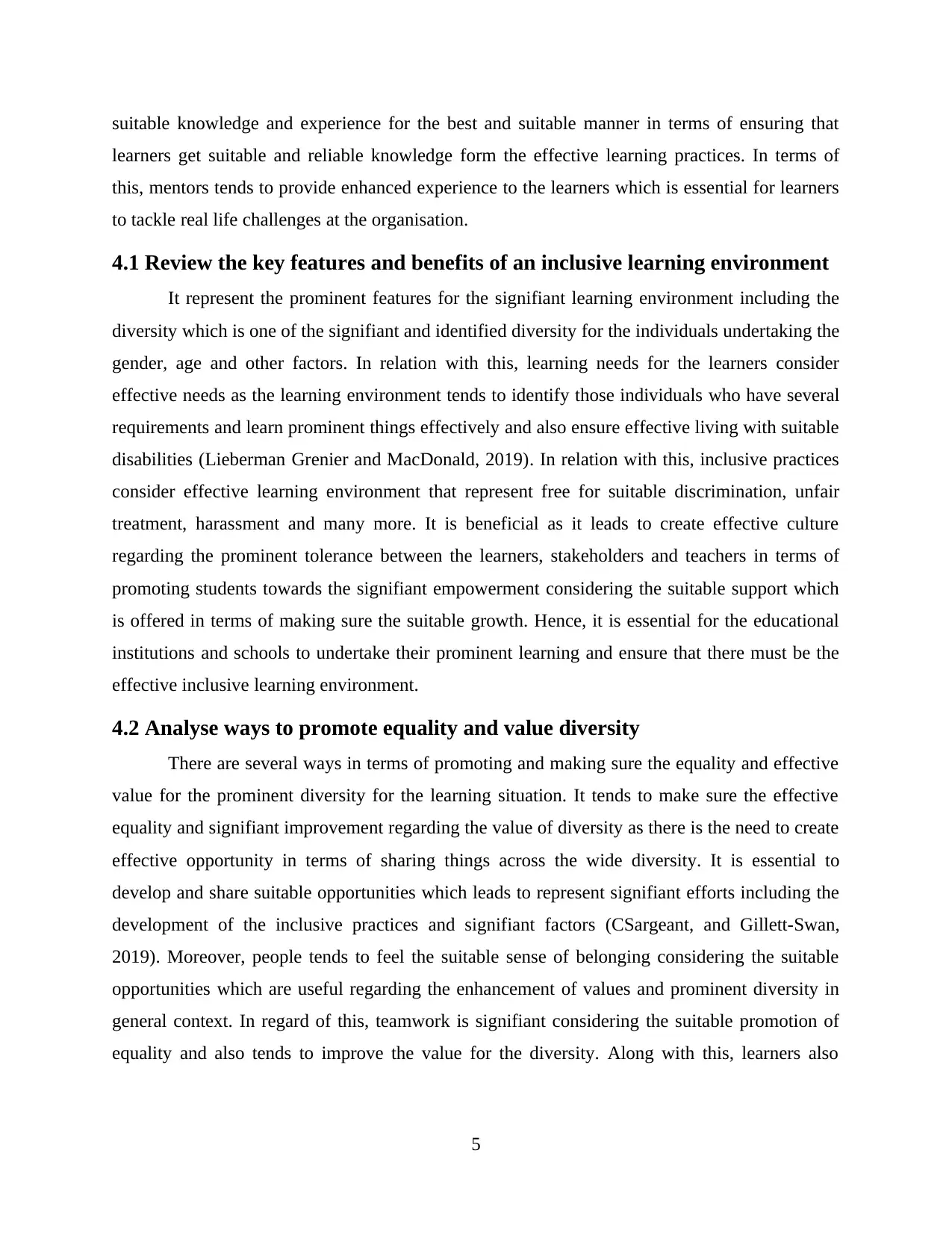
suitable knowledge and experience for the best and suitable manner in terms of ensuring that
learners get suitable and reliable knowledge form the effective learning practices. In terms of
this, mentors tends to provide enhanced experience to the learners which is essential for learners
to tackle real life challenges at the organisation.
4.1 Review the key features and benefits of an inclusive learning environment
It represent the prominent features for the signifiant learning environment including the
diversity which is one of the signifiant and identified diversity for the individuals undertaking the
gender, age and other factors. In relation with this, learning needs for the learners consider
effective needs as the learning environment tends to identify those individuals who have several
requirements and learn prominent things effectively and also ensure effective living with suitable
disabilities (Lieberman Grenier and MacDonald, 2019). In relation with this, inclusive practices
consider effective learning environment that represent free for suitable discrimination, unfair
treatment, harassment and many more. It is beneficial as it leads to create effective culture
regarding the prominent tolerance between the learners, stakeholders and teachers in terms of
promoting students towards the signifiant empowerment considering the suitable support which
is offered in terms of making sure the suitable growth. Hence, it is essential for the educational
institutions and schools to undertake their prominent learning and ensure that there must be the
effective inclusive learning environment.
4.2 Analyse ways to promote equality and value diversity
There are several ways in terms of promoting and making sure the equality and effective
value for the prominent diversity for the learning situation. It tends to make sure the effective
equality and signifiant improvement regarding the value of diversity as there is the need to create
effective opportunity in terms of sharing things across the wide diversity. It is essential to
develop and share suitable opportunities which leads to represent signifiant efforts including the
development of the inclusive practices and signifiant factors (CSargeant, and Gillett-Swan,
2019). Moreover, people tends to feel the suitable sense of belonging considering the suitable
opportunities which are useful regarding the enhancement of values and prominent diversity in
general context. In regard of this, teamwork is signifiant considering the suitable promotion of
equality and also tends to improve the value for the diversity. Along with this, learners also
5
learners get suitable and reliable knowledge form the effective learning practices. In terms of
this, mentors tends to provide enhanced experience to the learners which is essential for learners
to tackle real life challenges at the organisation.
4.1 Review the key features and benefits of an inclusive learning environment
It represent the prominent features for the signifiant learning environment including the
diversity which is one of the signifiant and identified diversity for the individuals undertaking the
gender, age and other factors. In relation with this, learning needs for the learners consider
effective needs as the learning environment tends to identify those individuals who have several
requirements and learn prominent things effectively and also ensure effective living with suitable
disabilities (Lieberman Grenier and MacDonald, 2019). In relation with this, inclusive practices
consider effective learning environment that represent free for suitable discrimination, unfair
treatment, harassment and many more. It is beneficial as it leads to create effective culture
regarding the prominent tolerance between the learners, stakeholders and teachers in terms of
promoting students towards the signifiant empowerment considering the suitable support which
is offered in terms of making sure the suitable growth. Hence, it is essential for the educational
institutions and schools to undertake their prominent learning and ensure that there must be the
effective inclusive learning environment.
4.2 Analyse ways to promote equality and value diversity
There are several ways in terms of promoting and making sure the equality and effective
value for the prominent diversity for the learning situation. It tends to make sure the effective
equality and signifiant improvement regarding the value of diversity as there is the need to create
effective opportunity in terms of sharing things across the wide diversity. It is essential to
develop and share suitable opportunities which leads to represent signifiant efforts including the
development of the inclusive practices and signifiant factors (CSargeant, and Gillett-Swan,
2019). Moreover, people tends to feel the suitable sense of belonging considering the suitable
opportunities which are useful regarding the enhancement of values and prominent diversity in
general context. In regard of this, teamwork is signifiant considering the suitable promotion of
equality and also tends to improve the value for the diversity. Along with this, learners also
5
Paraphrase This Document
Need a fresh take? Get an instant paraphrase of this document with our AI Paraphraser
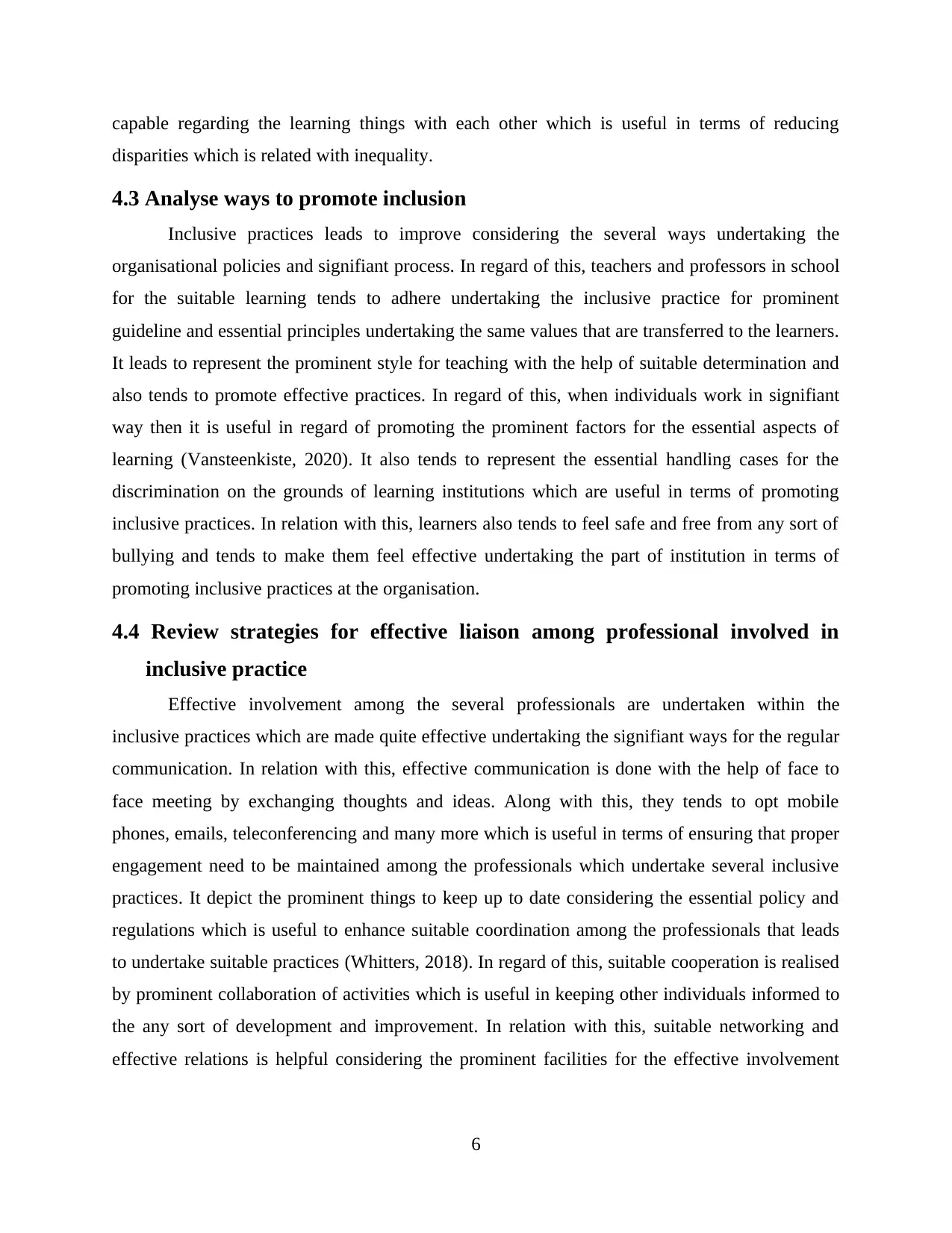
capable regarding the learning things with each other which is useful in terms of reducing
disparities which is related with inequality.
4.3 Analyse ways to promote inclusion
Inclusive practices leads to improve considering the several ways undertaking the
organisational policies and signifiant process. In regard of this, teachers and professors in school
for the suitable learning tends to adhere undertaking the inclusive practice for prominent
guideline and essential principles undertaking the same values that are transferred to the learners.
It leads to represent the prominent style for teaching with the help of suitable determination and
also tends to promote effective practices. In regard of this, when individuals work in signifiant
way then it is useful in regard of promoting the prominent factors for the essential aspects of
learning (Vansteenkiste, 2020). It also tends to represent the essential handling cases for the
discrimination on the grounds of learning institutions which are useful in terms of promoting
inclusive practices. In relation with this, learners also tends to feel safe and free from any sort of
bullying and tends to make them feel effective undertaking the part of institution in terms of
promoting inclusive practices at the organisation.
4.4 Review strategies for effective liaison among professional involved in
inclusive practice
Effective involvement among the several professionals are undertaken within the
inclusive practices which are made quite effective undertaking the signifiant ways for the regular
communication. In relation with this, effective communication is done with the help of face to
face meeting by exchanging thoughts and ideas. Along with this, they tends to opt mobile
phones, emails, teleconferencing and many more which is useful in terms of ensuring that proper
engagement need to be maintained among the professionals which undertake several inclusive
practices. It depict the prominent things to keep up to date considering the essential policy and
regulations which is useful to enhance suitable coordination among the professionals that leads
to undertake suitable practices (Whitters, 2018). In regard of this, suitable cooperation is realised
by prominent collaboration of activities which is useful in keeping other individuals informed to
the any sort of development and improvement. In relation with this, suitable networking and
effective relations is helpful considering the prominent facilities for the effective involvement
6
disparities which is related with inequality.
4.3 Analyse ways to promote inclusion
Inclusive practices leads to improve considering the several ways undertaking the
organisational policies and signifiant process. In regard of this, teachers and professors in school
for the suitable learning tends to adhere undertaking the inclusive practice for prominent
guideline and essential principles undertaking the same values that are transferred to the learners.
It leads to represent the prominent style for teaching with the help of suitable determination and
also tends to promote effective practices. In regard of this, when individuals work in signifiant
way then it is useful in regard of promoting the prominent factors for the essential aspects of
learning (Vansteenkiste, 2020). It also tends to represent the essential handling cases for the
discrimination on the grounds of learning institutions which are useful in terms of promoting
inclusive practices. In relation with this, learners also tends to feel safe and free from any sort of
bullying and tends to make them feel effective undertaking the part of institution in terms of
promoting inclusive practices at the organisation.
4.4 Review strategies for effective liaison among professional involved in
inclusive practice
Effective involvement among the several professionals are undertaken within the
inclusive practices which are made quite effective undertaking the signifiant ways for the regular
communication. In relation with this, effective communication is done with the help of face to
face meeting by exchanging thoughts and ideas. Along with this, they tends to opt mobile
phones, emails, teleconferencing and many more which is useful in terms of ensuring that proper
engagement need to be maintained among the professionals which undertake several inclusive
practices. It depict the prominent things to keep up to date considering the essential policy and
regulations which is useful to enhance suitable coordination among the professionals that leads
to undertake suitable practices (Whitters, 2018). In regard of this, suitable cooperation is realised
by prominent collaboration of activities which is useful in keeping other individuals informed to
the any sort of development and improvement. In relation with this, suitable networking and
effective relations is helpful considering the prominent facilities for the effective involvement
6
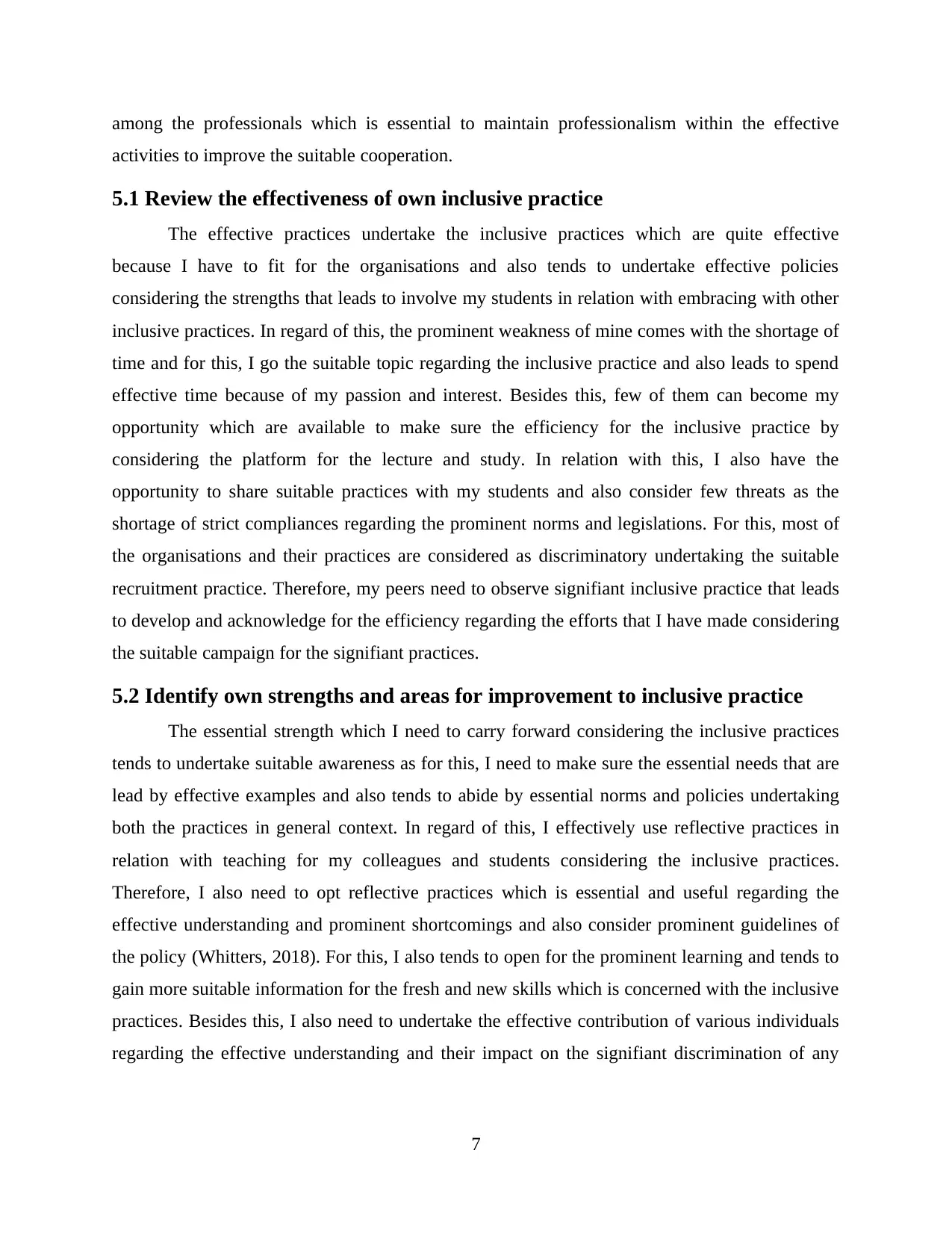
among the professionals which is essential to maintain professionalism within the effective
activities to improve the suitable cooperation.
5.1 Review the effectiveness of own inclusive practice
The effective practices undertake the inclusive practices which are quite effective
because I have to fit for the organisations and also tends to undertake effective policies
considering the strengths that leads to involve my students in relation with embracing with other
inclusive practices. In regard of this, the prominent weakness of mine comes with the shortage of
time and for this, I go the suitable topic regarding the inclusive practice and also leads to spend
effective time because of my passion and interest. Besides this, few of them can become my
opportunity which are available to make sure the efficiency for the inclusive practice by
considering the platform for the lecture and study. In relation with this, I also have the
opportunity to share suitable practices with my students and also consider few threats as the
shortage of strict compliances regarding the prominent norms and legislations. For this, most of
the organisations and their practices are considered as discriminatory undertaking the suitable
recruitment practice. Therefore, my peers need to observe signifiant inclusive practice that leads
to develop and acknowledge for the efficiency regarding the efforts that I have made considering
the suitable campaign for the signifiant practices.
5.2 Identify own strengths and areas for improvement to inclusive practice
The essential strength which I need to carry forward considering the inclusive practices
tends to undertake suitable awareness as for this, I need to make sure the essential needs that are
lead by effective examples and also tends to abide by essential norms and policies undertaking
both the practices in general context. In regard of this, I effectively use reflective practices in
relation with teaching for my colleagues and students considering the inclusive practices.
Therefore, I also need to opt reflective practices which is essential and useful regarding the
effective understanding and prominent shortcomings and also consider prominent guidelines of
the policy (Whitters, 2018). For this, I also tends to open for the prominent learning and tends to
gain more suitable information for the fresh and new skills which is concerned with the inclusive
practices. Besides this, I also need to undertake the effective contribution of various individuals
regarding the effective understanding and their impact on the signifiant discrimination of any
7
activities to improve the suitable cooperation.
5.1 Review the effectiveness of own inclusive practice
The effective practices undertake the inclusive practices which are quite effective
because I have to fit for the organisations and also tends to undertake effective policies
considering the strengths that leads to involve my students in relation with embracing with other
inclusive practices. In regard of this, the prominent weakness of mine comes with the shortage of
time and for this, I go the suitable topic regarding the inclusive practice and also leads to spend
effective time because of my passion and interest. Besides this, few of them can become my
opportunity which are available to make sure the efficiency for the inclusive practice by
considering the platform for the lecture and study. In relation with this, I also have the
opportunity to share suitable practices with my students and also consider few threats as the
shortage of strict compliances regarding the prominent norms and legislations. For this, most of
the organisations and their practices are considered as discriminatory undertaking the suitable
recruitment practice. Therefore, my peers need to observe signifiant inclusive practice that leads
to develop and acknowledge for the efficiency regarding the efforts that I have made considering
the suitable campaign for the signifiant practices.
5.2 Identify own strengths and areas for improvement to inclusive practice
The essential strength which I need to carry forward considering the inclusive practices
tends to undertake suitable awareness as for this, I need to make sure the essential needs that are
lead by effective examples and also tends to abide by essential norms and policies undertaking
both the practices in general context. In regard of this, I effectively use reflective practices in
relation with teaching for my colleagues and students considering the inclusive practices.
Therefore, I also need to opt reflective practices which is essential and useful regarding the
effective understanding and prominent shortcomings and also consider prominent guidelines of
the policy (Whitters, 2018). For this, I also tends to open for the prominent learning and tends to
gain more suitable information for the fresh and new skills which is concerned with the inclusive
practices. Besides this, I also need to undertake the effective contribution of various individuals
regarding the effective understanding and their impact on the signifiant discrimination of any
7
⊘ This is a preview!⊘
Do you want full access?
Subscribe today to unlock all pages.

Trusted by 1+ million students worldwide
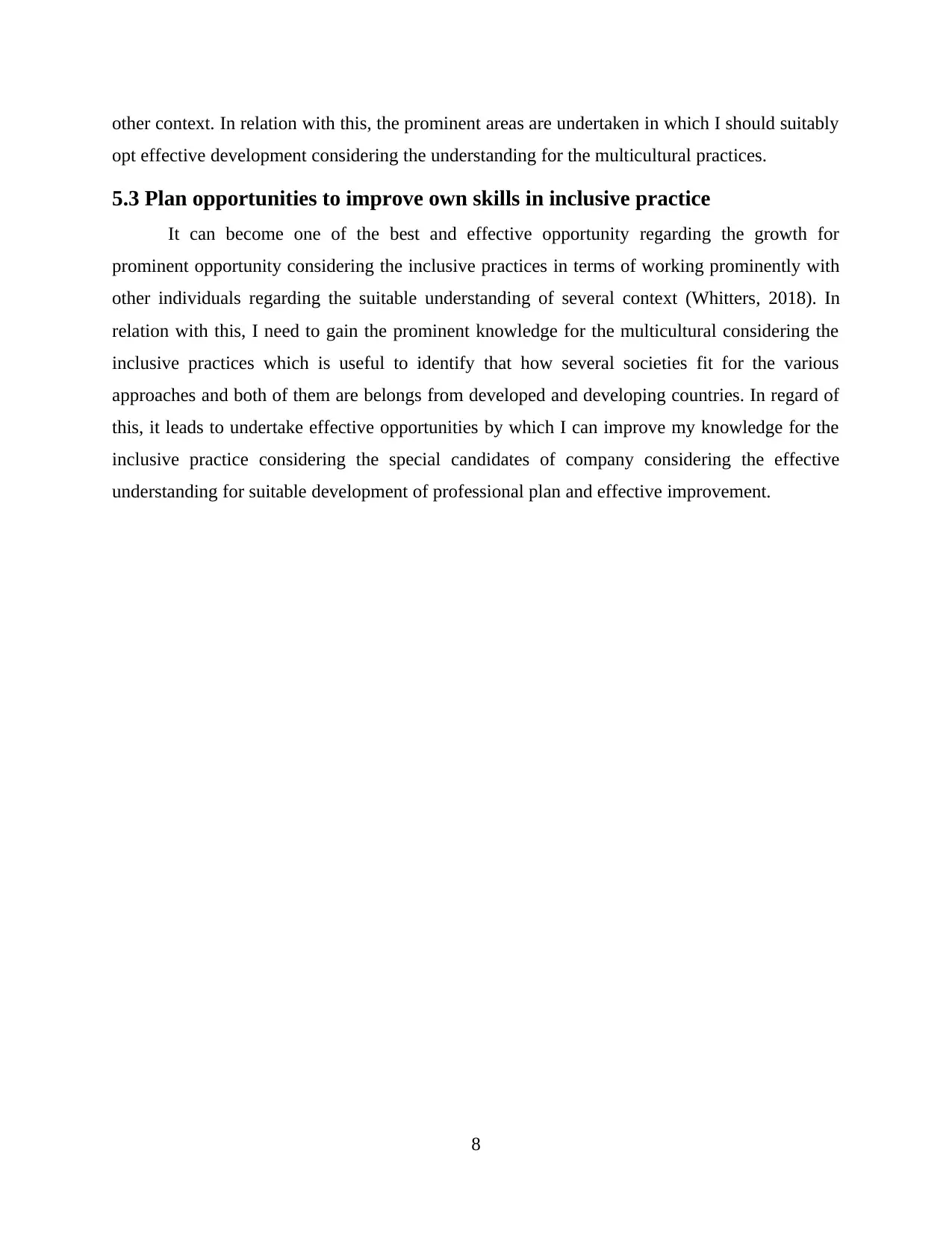
other context. In relation with this, the prominent areas are undertaken in which I should suitably
opt effective development considering the understanding for the multicultural practices.
5.3 Plan opportunities to improve own skills in inclusive practice
It can become one of the best and effective opportunity regarding the growth for
prominent opportunity considering the inclusive practices in terms of working prominently with
other individuals regarding the suitable understanding of several context (Whitters, 2018). In
relation with this, I need to gain the prominent knowledge for the multicultural considering the
inclusive practices which is useful to identify that how several societies fit for the various
approaches and both of them are belongs from developed and developing countries. In regard of
this, it leads to undertake effective opportunities by which I can improve my knowledge for the
inclusive practice considering the special candidates of company considering the effective
understanding for suitable development of professional plan and effective improvement.
8
opt effective development considering the understanding for the multicultural practices.
5.3 Plan opportunities to improve own skills in inclusive practice
It can become one of the best and effective opportunity regarding the growth for
prominent opportunity considering the inclusive practices in terms of working prominently with
other individuals regarding the suitable understanding of several context (Whitters, 2018). In
relation with this, I need to gain the prominent knowledge for the multicultural considering the
inclusive practices which is useful to identify that how several societies fit for the various
approaches and both of them are belongs from developed and developing countries. In regard of
this, it leads to undertake effective opportunities by which I can improve my knowledge for the
inclusive practice considering the special candidates of company considering the effective
understanding for suitable development of professional plan and effective improvement.
8
Paraphrase This Document
Need a fresh take? Get an instant paraphrase of this document with our AI Paraphraser
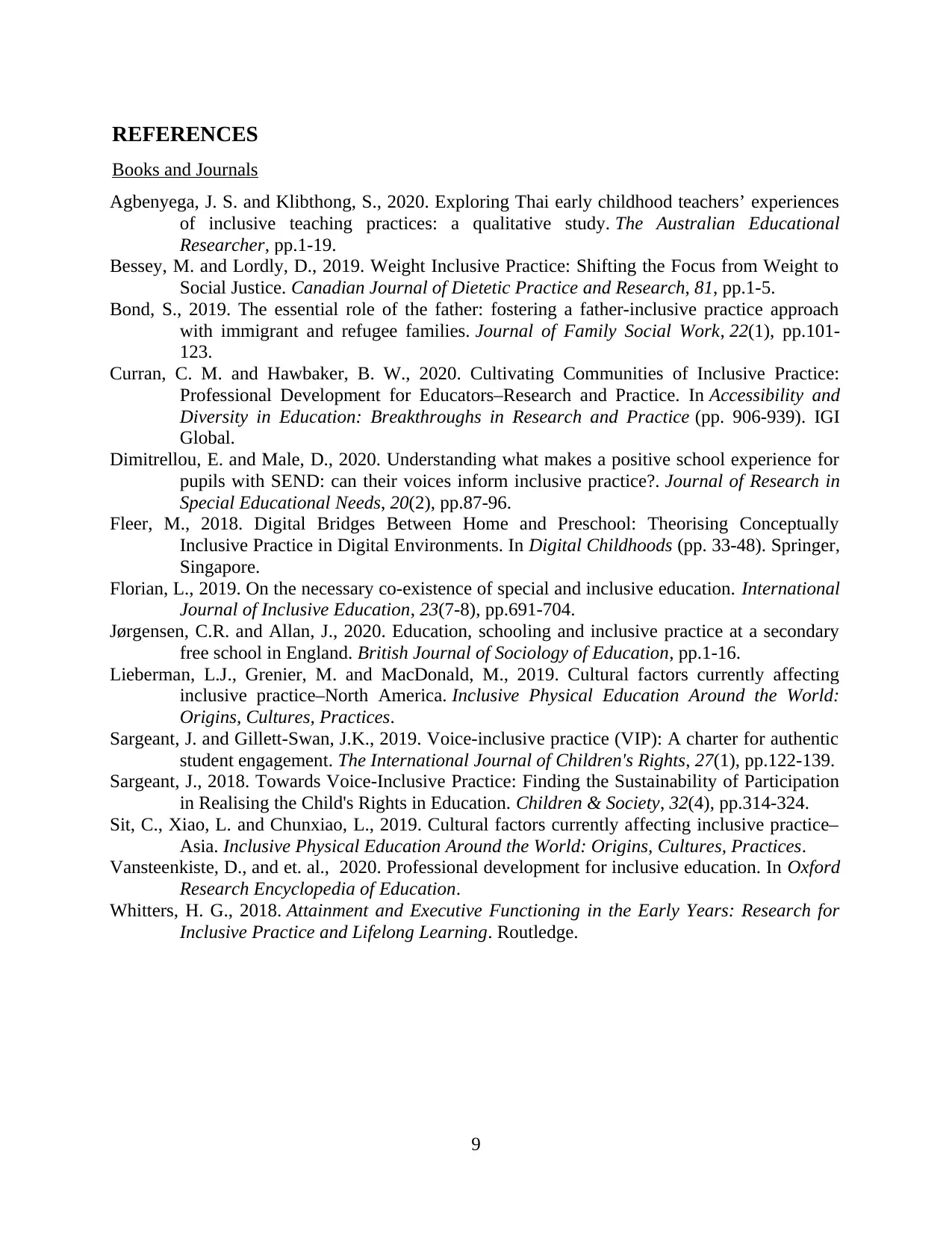
REFERENCES
Books and Journals
Agbenyega, J. S. and Klibthong, S., 2020. Exploring Thai early childhood teachers’ experiences
of inclusive teaching practices: a qualitative study. The Australian Educational
Researcher, pp.1-19.
Bessey, M. and Lordly, D., 2019. Weight Inclusive Practice: Shifting the Focus from Weight to
Social Justice. Canadian Journal of Dietetic Practice and Research, 81, pp.1-5.
Bond, S., 2019. The essential role of the father: fostering a father-inclusive practice approach
with immigrant and refugee families. Journal of Family Social Work, 22(1), pp.101-
123.
Curran, C. M. and Hawbaker, B. W., 2020. Cultivating Communities of Inclusive Practice:
Professional Development for Educators–Research and Practice. In Accessibility and
Diversity in Education: Breakthroughs in Research and Practice (pp. 906-939). IGI
Global.
Dimitrellou, E. and Male, D., 2020. Understanding what makes a positive school experience for
pupils with SEND: can their voices inform inclusive practice?. Journal of Research in
Special Educational Needs, 20(2), pp.87-96.
Fleer, M., 2018. Digital Bridges Between Home and Preschool: Theorising Conceptually
Inclusive Practice in Digital Environments. In Digital Childhoods (pp. 33-48). Springer,
Singapore.
Florian, L., 2019. On the necessary co-existence of special and inclusive education. International
Journal of Inclusive Education, 23(7-8), pp.691-704.
Jørgensen, C.R. and Allan, J., 2020. Education, schooling and inclusive practice at a secondary
free school in England. British Journal of Sociology of Education, pp.1-16.
Lieberman, L.J., Grenier, M. and MacDonald, M., 2019. Cultural factors currently affecting
inclusive practice–North America. Inclusive Physical Education Around the World:
Origins, Cultures, Practices.
Sargeant, J. and Gillett-Swan, J.K., 2019. Voice-inclusive practice (VIP): A charter for authentic
student engagement. The International Journal of Children's Rights, 27(1), pp.122-139.
Sargeant, J., 2018. Towards Voice‐Inclusive Practice: Finding the Sustainability of Participation
in Realising the Child's Rights in Education. Children & Society, 32(4), pp.314-324.
Sit, C., Xiao, L. and Chunxiao, L., 2019. Cultural factors currently affecting inclusive practice–
Asia. Inclusive Physical Education Around the World: Origins, Cultures, Practices.
Vansteenkiste, D., and et. al., 2020. Professional development for inclusive education. In Oxford
Research Encyclopedia of Education.
Whitters, H. G., 2018. Attainment and Executive Functioning in the Early Years: Research for
Inclusive Practice and Lifelong Learning. Routledge.
9
Books and Journals
Agbenyega, J. S. and Klibthong, S., 2020. Exploring Thai early childhood teachers’ experiences
of inclusive teaching practices: a qualitative study. The Australian Educational
Researcher, pp.1-19.
Bessey, M. and Lordly, D., 2019. Weight Inclusive Practice: Shifting the Focus from Weight to
Social Justice. Canadian Journal of Dietetic Practice and Research, 81, pp.1-5.
Bond, S., 2019. The essential role of the father: fostering a father-inclusive practice approach
with immigrant and refugee families. Journal of Family Social Work, 22(1), pp.101-
123.
Curran, C. M. and Hawbaker, B. W., 2020. Cultivating Communities of Inclusive Practice:
Professional Development for Educators–Research and Practice. In Accessibility and
Diversity in Education: Breakthroughs in Research and Practice (pp. 906-939). IGI
Global.
Dimitrellou, E. and Male, D., 2020. Understanding what makes a positive school experience for
pupils with SEND: can their voices inform inclusive practice?. Journal of Research in
Special Educational Needs, 20(2), pp.87-96.
Fleer, M., 2018. Digital Bridges Between Home and Preschool: Theorising Conceptually
Inclusive Practice in Digital Environments. In Digital Childhoods (pp. 33-48). Springer,
Singapore.
Florian, L., 2019. On the necessary co-existence of special and inclusive education. International
Journal of Inclusive Education, 23(7-8), pp.691-704.
Jørgensen, C.R. and Allan, J., 2020. Education, schooling and inclusive practice at a secondary
free school in England. British Journal of Sociology of Education, pp.1-16.
Lieberman, L.J., Grenier, M. and MacDonald, M., 2019. Cultural factors currently affecting
inclusive practice–North America. Inclusive Physical Education Around the World:
Origins, Cultures, Practices.
Sargeant, J. and Gillett-Swan, J.K., 2019. Voice-inclusive practice (VIP): A charter for authentic
student engagement. The International Journal of Children's Rights, 27(1), pp.122-139.
Sargeant, J., 2018. Towards Voice‐Inclusive Practice: Finding the Sustainability of Participation
in Realising the Child's Rights in Education. Children & Society, 32(4), pp.314-324.
Sit, C., Xiao, L. and Chunxiao, L., 2019. Cultural factors currently affecting inclusive practice–
Asia. Inclusive Physical Education Around the World: Origins, Cultures, Practices.
Vansteenkiste, D., and et. al., 2020. Professional development for inclusive education. In Oxford
Research Encyclopedia of Education.
Whitters, H. G., 2018. Attainment and Executive Functioning in the Early Years: Research for
Inclusive Practice and Lifelong Learning. Routledge.
9
1 out of 11
Related Documents
Your All-in-One AI-Powered Toolkit for Academic Success.
+13062052269
info@desklib.com
Available 24*7 on WhatsApp / Email
![[object Object]](/_next/static/media/star-bottom.7253800d.svg)
Unlock your academic potential
Copyright © 2020–2026 A2Z Services. All Rights Reserved. Developed and managed by ZUCOL.





